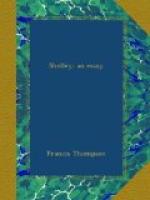From the temples
high
Of man’s
ear and eye
Roofed over Sculpture and Poesy,
* * * * *
From those skiey
towers
Where Thought’s
crowned powers
Sit watching your dance, ye happy
Hours!
Our feet now,
every palm,
Are sandalled
with calm,
And the dew of our wings is a rain
of balm;
And beyond our
eyes
The human love
lies
Which makes all it gazes on Paradise.
Any partial explanation will break in our hands before it reaches the root of such a power. The root, we take it, is this. He had an instinctive perception (immense in range and fertility, astonishing for its delicate intuition) of the underlying analogies the secret subterranean passages, between matter and soul; the chromatic scales, whereat we dimly guess, by which the Almighty modulates through all the keys of creation. Because, the more we consider it, the more likely does it appear that Nature is but an imperfect actress, whose constant changes of dress never change her manner and method, who is the same in all her parts.
To Shelley’s ethereal vision the most rarified mental or spiritual music traced its beautiful corresponding forms on the sand of outward things. He stood thus at the very junction-lines of the visible and invisible, and could shift the points as he willed. His thoughts became a mounted infantry, passing with baffling swiftness from horse to foot or foot to horse. He could express as he listed the material and the immaterial in terms of each other. Never has a poet in the past rivalled him as regards this gift, and hardly will any poet rival him as regards it in the future: men are like first to see the promised doom lay its hand on the tree of heaven and shake down the golden leaves. {7}




